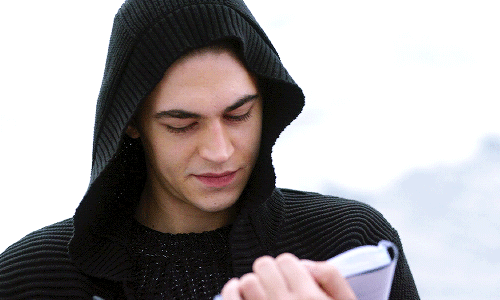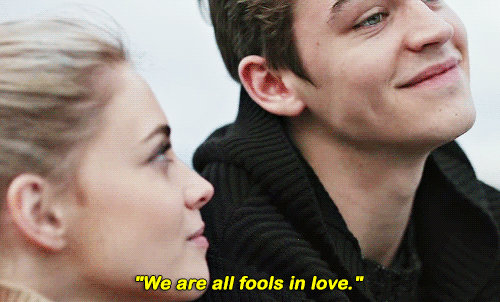Hello, everyone!
Historically, the romance genre hasn’t had a great track record when it comes to writing stories about emotionally healthy relationships. While the adrenaline rush of a dramatic courtship, with its swoon-worthy highs and agonizing lows, makes for a thrilling plot, such stories often leave the viewer with the expectation that romantic relationships should be full of conflict. What these books and movies often gloss over is the fact that conflict-heavy relationships can signal the presence of emotional abuse, especially when things like jealousy, possessiveness, and controlling behavior are added to the equation.
Rarely, however, does the romance genre feature stories in which an emotionally-abusive relationship is not only clearly present, but glorified to the fullest extent. The romance in question comes from the After series, a trilogy (soon to be quadrilogy?) of movies based off of Anna Todd’s novels. Todd originally published the novels on the fan-fiction site Wattpad, and modeled the male protagonist, Hardin Scott, after singer Harry Styles. While emotionally unhealthy relationships and fan-fiction often go hand in hand, what makes the After series so egregious is that it wraps a text-book case of emotional abuse in the trappings of rose-colored teen romance.

If you know anything about the After series, you might be scratching your head at why I’m writing this post. While the series has some core fans, it’s been lampooned on the Internet, with large Youtube creators like Dylan Is In Trouble and Alex Meyers roasting the series on their channels. Even though I agree that the series is silly (my first foray into the series was a hate-watch session with friends), it also has serious implications in ways that other teen romances don’t. It’s a film series marketed towards teenagers that presents an emotionally abusive relationship without any sort of commentary condemning or even acknowledging that abuse, and that sets a dangerous precedent for other films. I grew up watching romance movies with unhealthy relationships, but even compared to those films, the dynamic between Tessa and Hardin is beyond the pale.
The series follows Tessa, a naive young freshman at Washington State University. In her first week at school, she meets Hardin, a “bad boy” upperclassman who quickly seduces her. Even from the first scene, Hardin is a walking red flag. He and Tessa meet when she comes back from the shower and finds Hardin sitting in her dorm room reading The Great Gatsby. When she asks Hardin to leave so that she can get dressed, Hardin refuses, telling Tessa “not to flatter [her]self” and that he’s “not looking.”
From the first moment, Hardin is shown to be someone who doesn’t respect the boundaries of other people. Not only does Hardin refuse her request for him to leave, but he also insults her by implying that her body is unattractive enough to negate any need for privacy. The combination of boundary crossing behavior and manipulative insults would make any other character seem like a mean creep, but in this movie, those same qualities are used to bolster Hardin’s bad-boy credentials.
Things for Tessa only get worse from there, as the moment she lets Hardin enter her world, her life becomes a nightmare. In the first movie, Hardin takes advantage of Tessa’s naïveté by seducing her and giving her her first sexual experience, then rejecting her when she tries to enter a romantic relationship. When Tessa decides to tell her high school boyfriend Noah about the affair, Hardin tells her not to, and then gets jealous when Noah visits Tessa at school. Tessa again leaves Noah to comfort Hardin, which results in the end of her and Noah’s relationship, and consequently Tessa and Hardin officially being dating. Their on-again-off-again relationship continues until the end of the film, when a jealous friend reveals to Tessa that Hardin only dated her to prove to his friends that he could make her fall in love with him. Tessa is distraught at the news, but even though their entire relationship is built on lies, Hardin realizes that he has loved Tessa all along and is desperate to win her back.

Cue the vomiting.
On the surface, the story might seem like typical teenage antics, but Hardin’s behavior goes far beyond immature and verges into pure emotional abuse. Throughout the series, he is constantly second guessing Tessa’s motives, accusing her of cheating on him, and manipulating her into feeling sorry for him. He pouts, sulks, and yells at Tessa for the slightest transgressions, and gets into physical altercations with other male characters when they “insult” Tessa by talking to her or looking at her. The characters surrounding the pair tell Tessa that she is the best thing that ever happened to Hardin, but no one ever says that Hardin has added anything remotely positive to Tessa’s life.
The only time that Tessa and Hardin seem happy is when they’re having sex, which further bolsters the idea that their relationship is built purely on physical chemistry. They have so little in common that the only way that the screenwriters can think to show them connecting outside of the bedroom is through musical montages. But the happy parts of the series are few and far between, as Tessa and Hardin’s relationship gets progressively more depressing in each film. By the third film, even the trailer is wondering why these two are still together.
In fact, Tessa seems so miserable, defeated, and frightened whenever Hardin is present that the viewer starts to wonder how the movie can possibly believe that it’s portraying Hardin in a good light. It doesn’t help that the series is filled with other potential male love interests for Tessa that throw Hardin’s execrable personality into stark relief. Why, for instance, is the audience supposed to support Tessa choosing Hardin over Trevor in the second film, when Trevor has more emotional maturity in his right pinky than Hardin has in his entire body? The After series paints itself into a corner by trying to make it seem like Hardin’s toxic behaviors are desirable, but only succeeds in making him seem like the villain of his own story.
The series tries to justify Hardin’s jealousy, possessiveness, and controlling behavior by saying it’s rooted in childhood trauma, but the justification only serves as a cop-out for Hardin’s appalling actions. Tessa is constantly forgiving Hardin for his emotional abuse, and consequently, Hardin never has to face any real accountability for his behavior. Sure, he reads Tessa’s diary detailing the years of abuse and pain he’s caused her and decides that he’ll change his ways, but only a day later, he’s blaming Tessa for a nightmare he had about her cheating on him with her coworker. Everything Hardin does in the series is proof that he will never change, and yet for some reason, the audience is supposed to sympathize with him, while Tessa bears the brunt of his actions.
It mirrors a realistic emotionally abusive relationship to a tee: one partner walking on eggshells to avoid the sudden wrath of the other partner, suffering from manipulation, accusations, and hot-and-cold love, and latching on to tiny snatches of past affection as a reason to continue the dying relationship. If you searched for a checklist of emotional abuse, you’d find that the relationship in this series checks off almost every box. It’s frightening that the movie not only seems totally unaware of the abusive relationship at its center, but also that it promotes it as an aspirational romance for teens. The series endorses the idea that “true love” is worth any amount of pain and suffering, and that teens should sacrifice their own happiness to preserve a difficult relationship. And it plays right into an already existing canon of film that says that women should seek out men who are controlling, manipulative, and jealous, because all of those qualities are signifiers of love. It’s a terrible message to send to viewers. The only purpose After serves is to be a primer on abuse.
